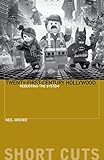Twenty-First-Century Hollywood : Rebooting the System / Neil Archer.
Material type: TextSeries: Short CutsPublisher: New York, NY : Columbia University Press, [2019]Copyright date: ©2019Description: 1 online resource : 16 b&w illustrationsContent type:
TextSeries: Short CutsPublisher: New York, NY : Columbia University Press, [2019]Copyright date: ©2019Description: 1 online resource : 16 b&w illustrationsContent type: - 9780231191593
- 9780231549455
- Blockbusters (Motion pictures) -- Production and direction -- California -- Los Angeles
- Motion picture industry -- California -- Los Angeles -- History -- 21st century
- Motion pictures -- Production and direction -- California -- Los Angeles
- Superhero films -- Production and direction -- California -- Los Angeles
- PERFORMING ARTS / Film & Video / General
- 384/.80979494 23
- online - DeGruyter
| Item type | Current library | Call number | URL | Status | Notes | Barcode | |
|---|---|---|---|---|---|---|---|
 eBook
eBook
|
Biblioteca "Angelicum" Pont. Univ. S.Tommaso d'Aquino Nuvola online | online - DeGruyter (Browse shelf(Opens below)) | Online access | Not for loan (Accesso limitato) | Accesso per gli utenti autorizzati / Access for authorized users | (dgr)9780231549455 |
Frontmatter -- CONTENTS -- ACKNOWLEDGEMENTS -- INTRODUCTION: REBOOTED? -- 1. WHY CAN’T HOLLYWOOD RELY ON FLYING SAUCERS? INDUSTRY, AUDIENCE AND FRANCHISE LOGIC -- 2. WHAT DOES HOLLYWOOD REALLY LIKE ABOUT COMIC BOOKS? STRUCTURE AND STYLE IN MARVEL’S CINEMATIC UNIVERSE -- 3. IS HOLLYWOOD SAVING THE WORLD, OR IS THE WORLD SAVING HOLLYWOOD? INDUSTRIAL AUTHORSHIP AND EXPERIMENTAL BLOCKBUSTERS -- 4. WHY ARE THE MOST GROWN-UP FILMS MADE FOR CHILDREN? WAYS OF PLAYING IN THE FAMILY FILM -- FILMOGRAPHY -- BIBLIOGRAPHY -- INDEX
restricted access online access with authorization star
http://purl.org/coar/access_right/c_16ec
Twenty-First-Century Hollywood looks into the contexts of studio film production in the new century in order to understand what shapes the style and content of present-day cinema. In an era dominated in box-office terms by the franchise and the family film, this book combines close textual readings and industrial analysis, illustrating why these kinds of movies are favored in the contemporary climate by producers and audiences alike. Neil Archer critically explores the narrative and aesthetic strategies at work in Hollywood’s most high-profile films, from Harry Potter, to Marvel’s Cinematic Universe, to The Lego Movie. Along the way, the book answers some often unexpected questions: Why is Hollywood nervous about flying saucers? Why might the cinematic auteur be Hollywood’s savior? And why are the most grown-up movies those made for children? As this study shows, like the films themselves, the answers to these questions are often complex and surprising.
Mode of access: Internet via World Wide Web.
In English.
Description based on online resource; title from PDF title page (publisher's Web site, viewed 25. Jun 2024)


